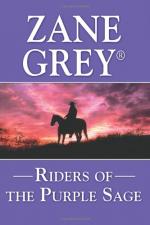The grim rider looked over his shoulder, but said no word. Fay’s golden hair floated on the breeze. The sun shone; the walls gleamed; the sage glistened. And then it seemed the sun vanished, the walls shaded, the sage paled. The horses walked—trotted—galloped—ran—to fall again to walk. Shadows gathered under shelving cliffs. The canyon turned, brightened, opened into a long, wide, wall-enclosed valley. Again the sun, lowering in the west, reddened the sage. Far ahead round, scrawled stone appeared to block the Pass.
“Bear up, Jane, bear up!” called Lassiter. “It’s our game, if you don’t weaken.”
“Lassiter! Go on—alone! Save little Fay!”
“Only with you!”
“Oh!—I’m a coward—a miserable coward! I can’t fight or think or hope or pray! I’m lost! Oh, Lassiter, look back! Is he coming? I’ll not—hold out—”
“Keep your breath, woman, an’ ride not for yourself or for me, but for Fay!”
A last breaking run across the sage brought Lassiter’s horse to a walk.
“He’s done,” said the rider.
“Oh, no—no!” moaned Jane.
“Look back, Jane, look back. Three—four miles we’ve come across this valley, en’ no Tull yet in sight. Only a few more miles!”
Jane looked back over the long stretch of sage, and found the narrow gap in the wall, out of which came a file of dark horses with a white horse in the lead. Sight of the riders acted upon Jane as a stimulant. The weight of cold, horrible terror lessened. And, gazing forward at the dogs, at Lassiter’s limping horse, at the blood on his face, at the rocks growing nearer, last at Fay’s golden hair, the ice left her veins, and slowly, strangely, she gained hold of strength that she believed would see her to the safety Lassiter promised. And, as she gazed, Lassiter’s horse stumbled and fell.
He swung his leg and slipped from the saddle.
“Jane, take the child,” he said, and lifted Fay up. Jane clasped her arms suddenly strong. “They’re gainin’,” went on Lassiter, as he watched the pursuing riders. “But we’ll beat ’em yet.”
Turning with Jane’s bridle in his hand, he was about to start when he saw the saddle-bag on the fallen horse.
“I’ve jest about got time,” he muttered, and with swift fingers that did not blunder or fumble he loosened the bag and threw it over his shoulder. Then he started to run, leading Jane’s horse, and he ran, and trotted, and walked, and ran again. Close ahead now Jane saw a rise of bare rock. Lassiter reached it, searched along the base, and, finding a low place, dragged the weary horse up and over round, smooth stone. Looking backward, Jane saw Tull’s white horse not a mile distant, with riders strung out in a long line behind him. Looking forward, she saw more valley to the right, and to the left a towering cliff. Lassiter pulled the horse and kept on.
Little Fay lay in her arms with wide-open eyes—eyes which were still shadowed by pain, but no longer fixed, glazed in terror. The golden curls blew across Jane’s lips; the little hands feebly clasped her arm; a ghost of a troubled, trustful smile hovered round the sweet lips. And Jane Withersteen awoke to the spirit of a lioness.




